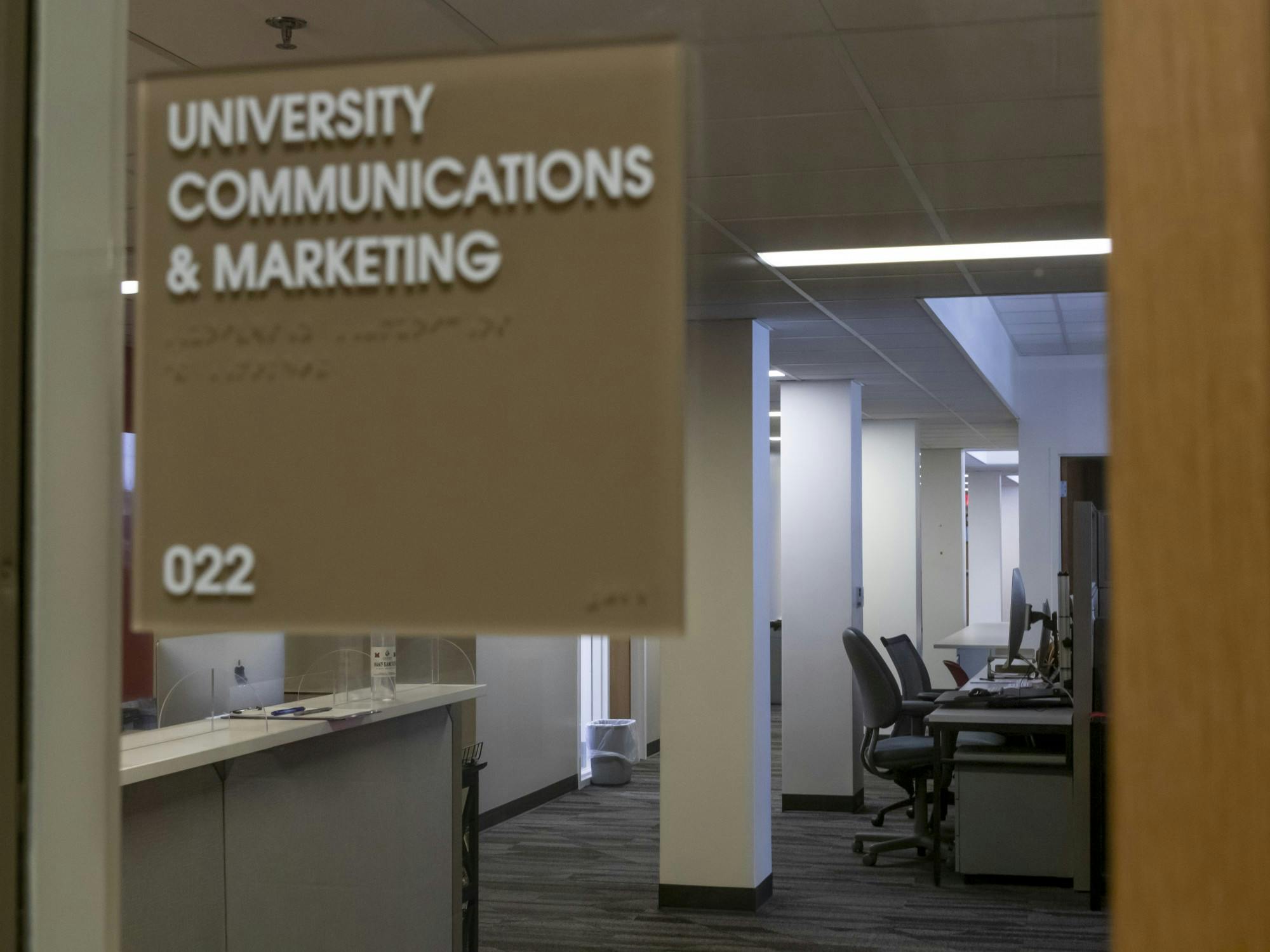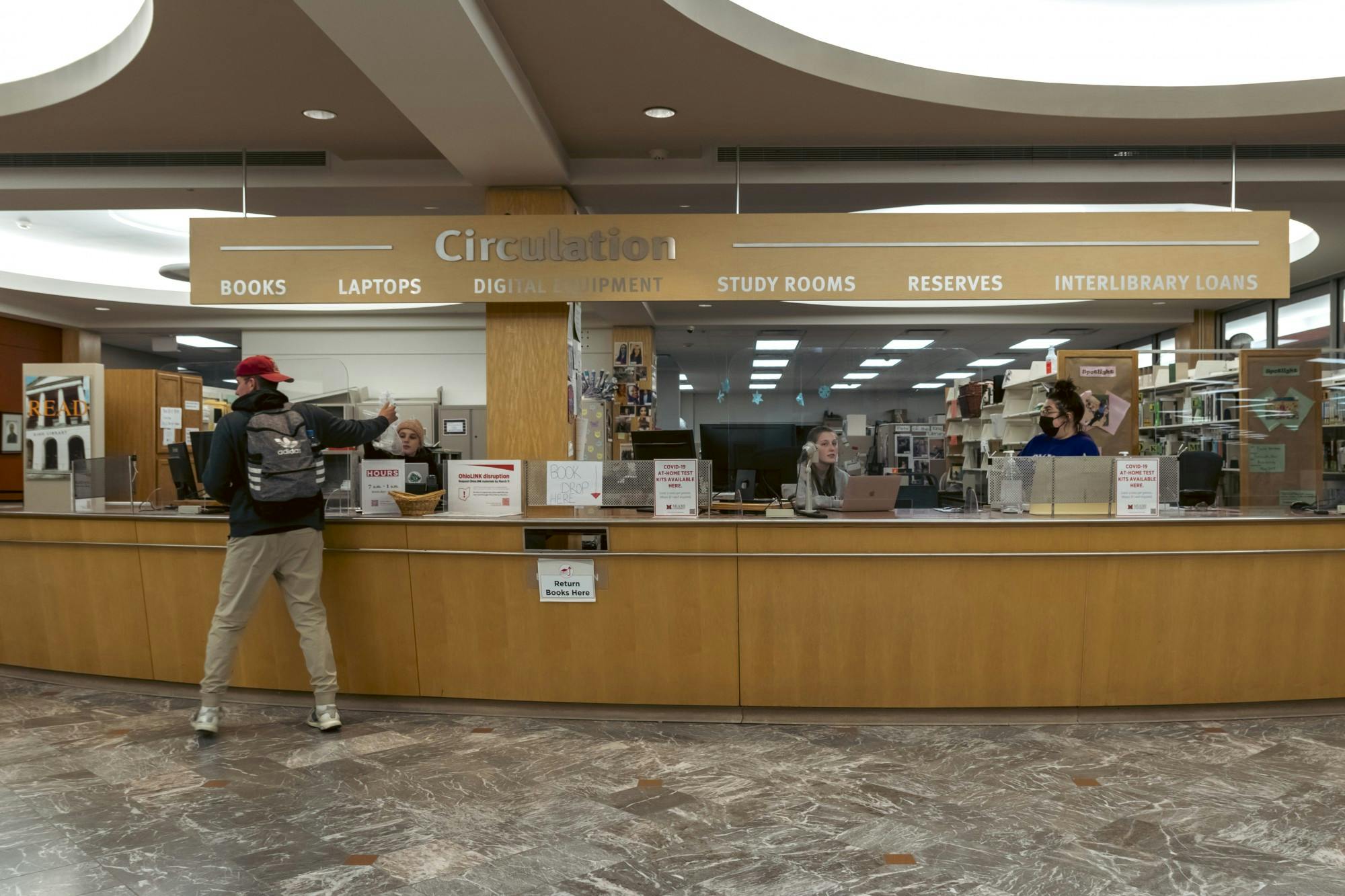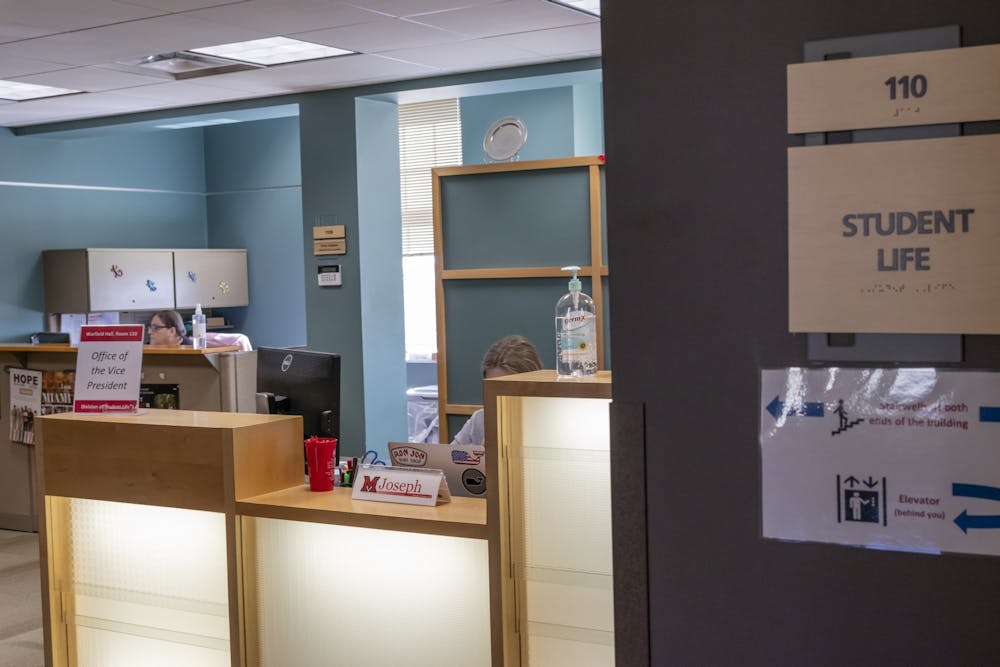Senior psychology major Josie Carter did most of the work for her internship with Miami University’s Office of the Dean of Students in person last semester. Her class schedule wasn’t too demanding, and she liked interacting with her coworkers beyond a screen.
This semester, it’s a different story.
“[Between] the way that my classes line up and my other work schedule, I'm unable to come into the office as much as I would like,” Carter said. “And so a lot of the work is remote, and I do have meetings virtually.”
When Carter first came to Miami, the thought of going to school or work online had never occurred to her.
“If you asked me as a freshman like, ‘Oh, do you expect to graduate and have a job or go to graduate school online?’ No, like that would suck,” Carter said. “I think that that's pretty unanimous.”
But two years into the pandemic, it’s a reality.
COVID-19 has fundamentally shifted employers’ and employees’ expectations for the day-to-day work experience. Coupled with the “Great Resignation,” many Miami departments are stretched thin, struggling to fill in-person positions.
Whether looking for hybrid or fully remote jobs, or opting to leave the workforce entirely, it’s a workers’ market now.
A shallow applicant pool

Staffing issues leave desks empty in the University Communications office.
Kimberly Moore, dean of students, hasn’t had an administrative assistant since December. In the newly-constricted job market, a replacement has been hard to find.
Enjoy what you're reading?
Signup for our newsletter
It’s not just Moore’s department. Eight divisions of Student Life have at least one vacancy, putting extra pressure on the remaining staff.
“That's not really going to impact or change how [students] are experiencing Miami at this point,” Moore said. “But it's impacting the staff that's here … Having to cover and do more than what is expected is challenging. You can do that temporarily, but you can't do it in the long run.”
Shallow applicant pools have similarly impacted Jaime Hunt, chief marketing and communications officer, with seven vacancies in her department.
The social media department, in particular, has been hit hard.
“We have three people who work in the area of social media,” Hunt said. “But two of those positions are vacant and then the individual in that third position is on maternity leave.”
Hunt’s role in the office now includes ensuring burnout and absences, especially on the social media team, don’t overwhelm remaining employees. Many projects have been placed on the backburner to ensure essential functions are carried out.
“There's definitely people who are working and doing tasks beyond their typical workload,” Hunt said. “But we've been trying to be very careful not to drive people away by dumping other people's work on to them because that's not going to be productive.”
David Seidl, vice president for information technology, said the Information Technology (IT) team has 15 vacancies across 129 positions.
Since June 2021, 13 of Seidl’s employees have retired early, moved on to other employers or shifted departments while staying at Miami. While early career developers switch jobs often, Seidl said the holes they leave are getting harder to fill.
“We're seeing a quarter or half [the number of applicants] that we would have seen before [the pandemic],” Seidl said. “ … We're seeing a decline, but we're still able to hire good people.”
Hybrid work schedules
Before 2020, most staff did their work in person. Because IT jobs rely heavily on screens, the shift to remote work at the start of the pandemic was easier for Seidl and his team than some departments on campus.
The shift back to in person proved more challenging, though. Seidl said many employees didn’t want to deal with long commutes to sit in front of a screen on campus rather than at home.
Now, as much as 70% of IT staff report for work virtually on a given day.
“At this point, through the pandemic and everybody going home, we've now gotten to a point where it's basically a hiring necessity [to offer remote work],” Seidl said.
One sector of IT employees is barred from working remotely, though: student interns.
Senior data analytics and statistics major Hunter Fitch has worked as a data visualization intern since September 2020. The role was remote while most of Miami’s classes were online, but he’s had to report in person each week this year. Some full-time staff members, meanwhile, have the option to remain remote.
While Fitch doesn’t mind working in person, he said there are coworkers he works with who he’s never met.
“It's a little bit weird why they didn't allow students to work remotely while full-timers can,” Fitch said. “[But] those people have to commute, and it saves them a lot of time and money by working remotely.”
In King Library, a large portion of staff has transitioned to a flexible work schedule to continue attracting and retaining good talent.
Having two fewer hour-and-half commutes per week has given strategic communications coordinator Nick Kneer much needed time back in his home life.
“If I had an important delivery or I had to let in a repair person, I would've had to take the whole day off,” Kneer said. “Now if I just have to sign for a package, I'll just do that while working remotely.”
Applications like Google Suite and Zoom allow King flexible scheduling without sacrificing efficiency and service.
“We want to make sure everything we do is going to further the service that we're able to provide for students, faculty and staff,” Kneer said.
In communications, Hunt said many applicants expect fully remote work, an option she can’t offer.
“We're upfront [regarding remote policies], but we're still finding people are thinking [that] by the time we're sold on them as a candidate, we'll be willing to change that,” Hunt said. “But we're not able to.”
Fully remote work for many employees in the department would sacrifice the authenticity of her team’s work, Hunt said.
“University Communications and Marketing is responsible for telling the Miami story, and that's hard to do if you're not ever on campus, and not ever feeling the vibe of campus or interacting with our students,” Hunt said. “We're not a student-facing office, but you still need to talk to students to really understand what we have here.”
The workers left on campus

Employees in front-facing positions like the circulation desk in King Library have to report to work in person.
For service departments like dining and residence life, it’s nearly impossible to offer staff members remote work options.
Vicka Bell-Robinson, director of Residence Life, said her staff needs to be available in person to connect with students.
“We don't spend a lot of time doing work from home or remote options,” Bell-Robinson said. “Because all the students are here, Residence Life should be here.”
While The Office of Residence Life’s (ORL) center offices are fully staffed, a shortage of Resident Assistants (RA) this year has resulted in a higher ratio of residents per RA.
ORL started the year with 11 out of 250 positions vacant, but the number of unfilled positions has increased throughout the year. Although it’s recruiting more aggressively, Bell-Robinson said ORL isn’t looking to hire just “warm bodies.”
“[The student] experience is important, and we want to make sure that we are bringing the best Residence Life Group,” Bell-Robinson said. “That might mean we have some vacancies for a little bit, but we're gonna make that decision over hiring somebody because we need someone.”
Other front-facing positions at Miami, from physical facilities to dining halls, have stayed in person by necessity. When employees opted not to return last fall when most students came back to campus, the workers remaining were hit hard.
Even dining halls that are well-staffed now could face shortages in the future.
Deanna Hay, a sophomore employee at Western Dining Hall, said the number of workers on each shift at Western seems excessive, with too little work for too many people.
From conversations with her co-workers, though, Hay knows some full-time workers plan to leave soon. She said dining may need to rely on part-time student employees more in the future to handle potential staffing shortages.
“They rely a lot on the full-time workers and train them more thoroughly,” Hay said. “As part-time workers … if they possibly relied more on the students and gave them more responsibilities, that would kind of solve the issue of not having full-time staff.”
Liz Short, senior psychology major, started working at Emporium in fall 2019. After getting sent home in spring 2020, the next fall semester came with a depleted staff.
“There were just so many shifts open, but we were able to just make it work,” Short said. “Usually someone from another market would come in or a full-time employee would come in and cover our shifts for us.”
The full-time employees came from other markets and management positions, often with only 15 minutes’ notice. But while supply chain issues and labor shortages impacted dining halls last semester, Short said Emporium has handled student demand this spring.
“I’ve seen long lines, but they don't usually last a while,” Short said. “It's like five minutes at the most … It was mostly in the beginning of the semester with the longer lines because we had a lot of new people.”
While some student employees have experienced relief, Miami’s administration is still feeling some residual effects and struggling to find employees.
“I have a whiteboard on my wall,” Hunt said, “and the very top of my list is ‘hiring’ in all caps.”




